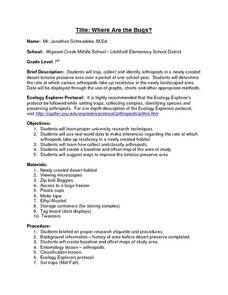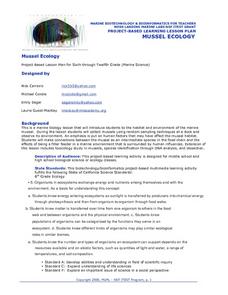Curated OER
You Are What You Drink!
Students explore water treatment systems. In this water conservation ecology activity, students identify and explain several processes used for water treatment and define related vocabulary after listening to content information given...
Curated OER
Around-The-World-Zoo
Junior biologists design and maintain a website about a zoo by researching, classifying, and providing the correct habitats for the animals they choose to have in their zoo. This technology-based project can last over an entire semester...
Curated OER
Ball Identification Exercise
Fourth graders participate in a ball identification exercise to help them identify birds. As a class, their teacher throws them a variety of different sized and colored balls for them to describe. Using these factors, they work together...
Curated OER
Where Are the Bugs?
Students trap, collect and identify arthropods in a newly created desert tortoise preserve area over a period of one school year. They determine the rate at which various arthropods take up residence in the newly landscaped area. Data is...
Curated OER
Identifying Birds
Eighth graders identify and name birds in their school yard by comparing and contrasting pictures of 12 common birds in the Phoenix metro area using the Ecology Explorers Protocol. They formulate questions based on observations that lead...
Curated OER
Mussel Ecology
Students are introduced to the marine environment of the mussel. The emphasis of the instructional activity is upon what human factors are present to influence the environment in positive and negative ways. They brainstorm in groups in...
Curated OER
Taming Wild Land
Third graders consider the habitat needs of living things and how extensive farming in an area can affect the plants and animals of a region. They participate in a simulation to show how changing the habitat in one area can greatly...
Curated OER
Johnny Appleseed
Young scholars engage in a study of apples using children's literature. They conduct research using a variety of resources. Student list facts about apples and compare them while answering some guided questions. They plant some apple...
Curated OER
The Reasons For The Seasons
Students investigate the different seasons that occur and how the weather is characterized according to the regions of The United States. They conduct research using the internet and then conduct classroom discussion while considering...
Curated OER
Holy Starbucks Batman
Students investigate caffeine as a potential new pollutant in a northwest river system. Effects of caffeine on invertebrates and salmon fry will be explored through field work and lab work.
Curated OER
Rainforests of the Sea
In this ecology worksheet, students read and study about coral reefs using online resources to complete 8 short answer questions. They watch a video related to the topic.
Curated OER
Secondhand Smoke
In this health science worksheet, learners complete 8 short answer questions after reading information on the "Health Effects of Exposure to Secondhand Smoke."
Curated OER
Drought in Your State
In this drought worksheet, students study the "US Drought Monitor" and complete 8 short answer questions on the causes and effects of drought.
Curated OER
How Tsunamis Form
In this earth science worksheet, students read and study facts about tsunami and earthquakes to complete 8 short answer questions that follow.
Curated OER
Shrinking Rainforests
In this rainforests worksheet, students study satellite images and rainforest facts. They complete 8 short answer questions that follow.
Curated OER
Explore Efficient Energy Uses
In this energy activity, students explore different ways to conserve energy. They write a short description for each of the 10 methods presented.
Curated OER
Invasive Mussels
In this ecology worksheet, students study a fact sheet on invasive mussels. They answer 8 short answer questions about it after reading the provided information.
Curated OER
How Fire Affects Wildllife
In this ecology lesson, students select an animal to study and read about how this animal adapts to ecological disaster. They complete 5 short answer questions after reading.
Curated OER
Ecology
In this ecology worksheet students complete a crossword puzzle that incorporates all of the ecological vocabulary in the word puzzle.
Curated OER
Biological Sciences
Students examine biodiversity and interrelatedness concepts. In this ecology lesson students go on a field trip and fill out a data sheet.
Curated OER
Field Trip to the Watsonville Wetlands
Students explore the differences between food webs and food chains. In this wetland lesson students play a food web game and go on a scavenger hunt.
Curated OER
Watershed Landscape
Students demonstrate how water flows by building a human watershed using themselves. In this ecology instructional activity, students compare and contrast point-source and non-point source pollution. They write what they have learned...
Curated OER
The New Haven Oyster Industry and Water Quality
Students examine the different types of water pollutants and how they affect the waterways. In this environmental science lesson, students collect and interpret data from government agencies. They discuss how industrial development in...

























